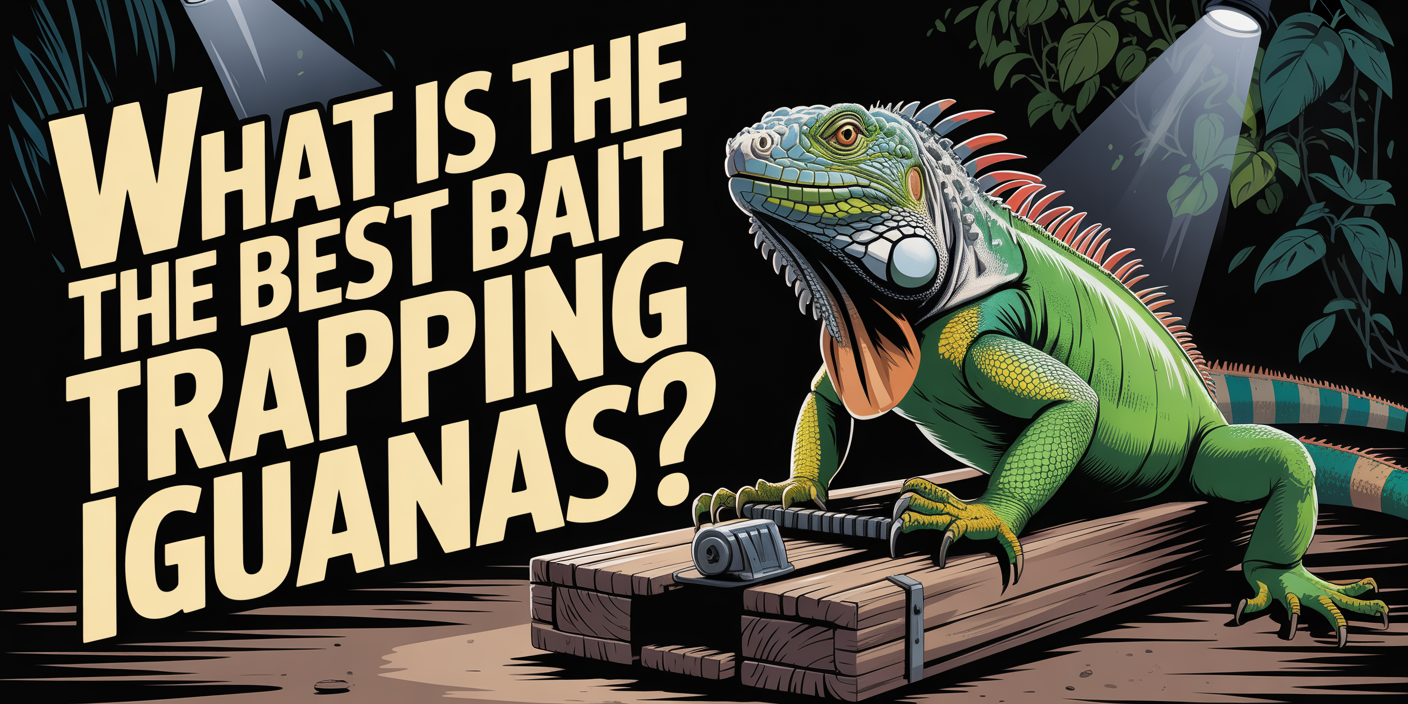“Ripe, fragrant fruit like mango or papaya is hands-down the best bait for trapping iguanas on the Treasure Coast. Sweet, colorful produce mirrors their natural diet and draws them straight into a live trap without luring unwanted critters.”
Green iguanas might look harmless basking on your seawall or lounging in your garden, but they’re anything but innocent. Across Florida’s Treasure Coast—including Port St. Lucie, Jensen Beach, and Stuart—these invasive reptiles have become a full-blown nuisance. They burrow under patios, damage sea walls, tear up landscaping, and leave droppings that carry salmonella. Worse, once they find a food source, they’ll return again and again—unless you do something strategic to stop them.
That’s where baited trapping comes in. While there are plenty of DIY hacks floating around online, using the right bait can make or break your efforts to get iguanas out of your yard. In this guide, we’ll break down what food iguanas can’t resist, how to bait trap iguanas effectively, and when it’s time to bring in professionals like AAAC Wildlife Removal of Treasure Coast. Let’s dive into what actually works so you can take back your property—without the guesswork.
Learn more: Do ultrasonic pest repellers work on iguanas?
What Do Iguanas Eat in the Wild?
Iguanas Are Plant-Loving Foragers
Green iguanas are strict herbivores, meaning they feed almost entirely on plants. In their natural habitat, they graze on leafy greens, tropical fruits, flowers, and young shoots. Their diet is high in fiber and water content, which keeps them hydrated in the Florida heat. Unlike raccoons or opossums, iguanas aren’t interested in garbage or meat scraps.
Favorite Foods Found on the Treasure Coast
Locally, iguanas have easy access to all sorts of tasty landscaping. They’re known to target hibiscus, bougainvillea, mangoes, bananas, and papayas—especially in residential gardens and waterfront properties. If your yard features bright flowers or fruit trees, you’ve probably already given them an open invitation. These cravings are exactly what make baiting traps so effective when done with the right ingredients.
What is the Best Bait for Trapping Iguanas?
- Mango Slices– Mango is a top-tier choice when it comes to trapping iguanas. The sweet, juicy scent is strong enough to carry in the breeze, which helps lure iguanas from hiding. Place thick slices in and around the trap to create an inviting trail.
- Papaya Chunks– Papaya has a soft texture and tropical aroma that iguanas find irresistible. It’s especially effective when slightly overripe, as the sugars intensify the smell. Make sure the pieces are big enough to catch attention but small enough to prevent quick snatching and escape.
- Strawberries– These small red fruits stand out visually and offer a strong sweet scent, making them perfect for baiting. Strawberries also hold up well in the heat for a few hours, giving you a bit more time before they start to rot or attract ants.
- Bananas– Overripe bananas work like a charm because they smell incredibly sweet and are easy for iguanas to nibble. You can smear a bit of banana on the trap entrance and leave chunks inside to encourage full entry.
- Hibiscus Flowers– If you’ve got access to fresh hibiscus blooms, you’re in luck. Iguanas are known to snack on these flowers right off the bush. Use them as colorful, fragrant bait or pair them with fruit for an even more appealing combo.
Are There Baits You Should Avoid?
1. Citrus Fruits
While oranges and lemons might seem like easy tropical options, most iguanas aren’t fans of citrus. The acidic scent and taste tend to repel rather than attract them, making citrus a poor choice for bait. Some homeowners even use citrus peels as a deterrent instead.
2. Processed or Cooked Foods
Avoid using anything from your kitchen scraps—especially bread, meat, or seasoned leftovers. Not only are these items outside an iguana’s natural diet, but they can also attract raccoons, opossums, and rodents, turning your trap into a buffet for the wrong guests.
3. Dry Pet Food or Pellets
Reptile pellets or cat kibble might work for other critters, but iguanas don’t respond well to dry, scentless food. They’re drawn to fresh produce with water content, so these dry baits are easy for them to ignore.
4. Wilted or Rotting Produce
It may be tempting to use old fruit from the fridge, but mushy, moldy food loses its effectiveness fast. It smells sour rather than sweet, and can even deter iguanas from approaching the trap.
5. Toxic or Harmful Plants
Some decorative plants and fruits are toxic to reptiles and should never be used as bait. Avocados, for example, contain compounds that can be harmful. Stick to known favorites like mango and papaya to keep trapping humane and legal.
How to Set Up a Baited Iguana Trap Properly
Choose the Right Trap
Start with a live cage trap that’s large enough to hold a full-grown iguana comfortably. Look for models with a sensitive trigger plate and a rear bait area to improve your catch rate. The trap should be easy to monitor and allow for safe, humane release or relocation.
Pick the Perfect Location
Trap placement matters just as much as the bait. Set the trap in areas where you’ve seen iguana activity—along sea walls, under docks, near patios, or close to garden beds. These are high-traffic zones where iguanas feed, sunbathe, or travel daily.
Set the Bait Strategically
Create a small trail of fruit chunks leading into the trap entrance to guide the iguana in. Place the majority of the bait at the far end of the trap, just beyond the trigger plate. Avoid overloading the area outside the trap, or you risk feeding them without a catch.
Check Frequently and Handle Responsibly
Traps should be checked every few hours to prevent stress, injury, or heat exposure. Always wear gloves when setting or handling traps to avoid transferring your scent. For a truly hands-off, humane approach, call the licensed experts at AAAC Wildlife Removal of Treasure Coast—they’ll handle everything by the book.
Can You Trap Iguanas on Your Own in Florida?
Yes, in most cases, Florida residents are allowed to trap green iguanas on their own property. The Florida Fish and Wildlife Conservation Commission (FWC) classifies these reptiles as invasive, meaning you can remove them year-round without a permit—as long as it’s done humanely and during daylight hours. Traps must meet humane standards, and the removal must take place strictly on private land. While the law gives you some flexibility, it also places full responsibility on you to follow local rules and avoid harming the animal or violating wildlife regulations.
That said, just because you can trap iguanas doesn’t mean it’s always a smart or easy job. Setting the trap incorrectly, choosing the wrong bait, or placing it in a low-traffic area can waste time and leave the problem unresolved. Plus, relocating a live iguana isn’t as simple as dropping it off somewhere else—it could be illegal depending on the location. This is why many Treasure Coast homeowners turn to AAAC Wildlife Removal of Treasure Coast. Their team handles everything from baiting to removal with expert care and full legal compliance, so you can skip the guesswork and get real results.
Why Trust AAAC Wildlife Removal of Treasure Coast for Iguana Problems?
When it comes to iguana control, experience and local knowledge make all the difference. AAAC Wildlife Removal of Treasure Coast isn’t just a general pest control service—they’re licensed wildlife specialists trained specifically in handling invasive reptiles like green iguanas. They understand the behaviors, hiding spots, and seasonal patterns unique to iguanas across Port St. Lucie, Stuart, Jensen Beach, and surrounding areas. Whether your property backs up to a canal, golf course, or beach access, their team knows exactly how to approach the problem.
What sets AAAC apart is their commitment to humane, effective removal strategies. From selecting the right bait and trap setup to ensuring full legal compliance, they take care of the entire process without guesswork or stress. Their removal plans often include prevention recommendations, so once the iguanas are gone, they stay gone. If you’re tired of seeing damage to your lawn, seawall, or garden—and want a solution that works the first time—AAAC Wildlife Removal of Treasure Coast is the team to call.
Pro Tip: Traps Aren’t Enough Without Prevention
Trapping solves the immediate problem, but if you’re not preventing new iguanas from moving in, you’re just playing whack-a-mole. Iguanas are highly territorial and will return if your yard continues to offer food, water, and shelter. That’s why long-term success depends on combining baited trapping with smart prevention tactics.
AAAC Wildlife Removal of Treasure Coast doesn’t just remove iguanas—they help homeowners make their properties less attractive to future invaders. That could include trimming vegetation, sealing entry points under decks, or installing barriers along seawalls. They may also recommend habitat modifications like swapping out iguana-friendly plants or using approved deterrents. It’s a full-circle solution that stops repeat problems before they start.
Call to Action: Schedule a Bait-Based Iguana Control Plan Today
If iguanas are tearing up your garden, sunbathing on your seawall, or digging under your patio, it’s time to act before the damage gets worse. AAAC Wildlife Removal of Treasure Coast offers expert iguana control services that start with the right bait and end with long-term prevention. Their team handles everything—from identifying problem areas to setting humane traps and sealing off access points.
Booking a consultation is quick and hassle-free. Whether you live in Stuart, Port St. Lucie, Jensen Beach, or a nearby waterfront community, AAAC’s local experts are ready to help. Call now or request a quote online to reclaim your property and get iguanas out of your yard for good.




